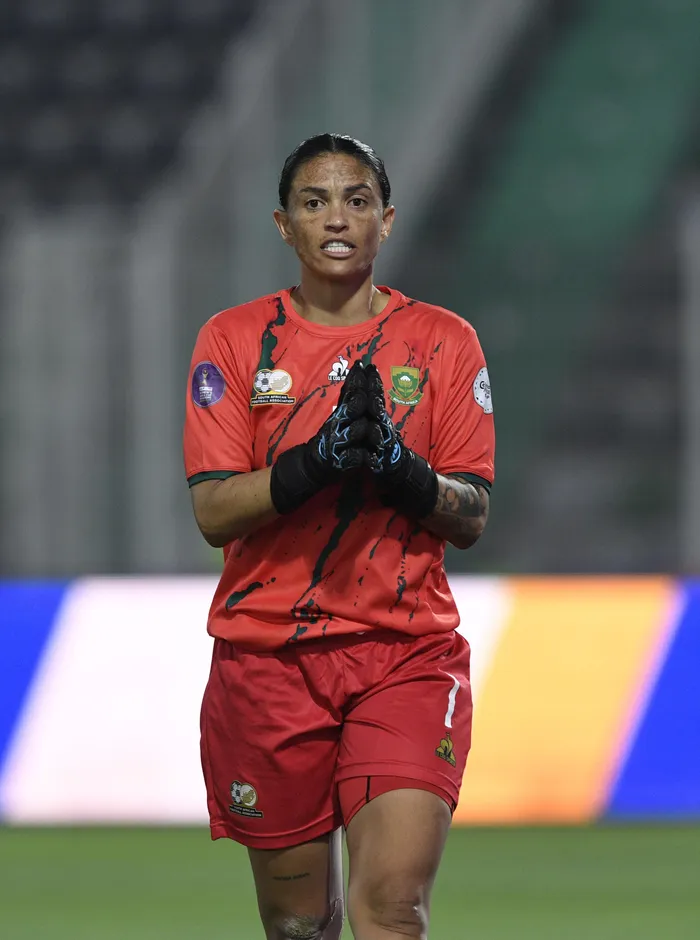Keeper call and the deeper questions facing Banyana Banyana
Women's Africa Cup of Nations

Kaylin Swart’s start over Andile Dlamini in Banyana Banyana’s 1-1 draw with Tanzania has reignited debate over team selection, strategy, and representation — with coach Desiree Ellis now under mounting scrutiny ahead of WAFCON’s decisive stages. Photo: Backpagepix
Image: Backpagepic
COMMENT
Banyana Banyana’s 1-1 draw with Tanzania on Friday was more than just a frustrating result — it was a performance that peeled back the layers of tactical intent, team cohesion, and national introspection.
At the heart of the storm is coach Desiree Ellis’ decision to start Kaylin Swart ahead of Andile Dlamini — a move that has opened the door to technical and political debate, just as South Africa’s title defence at WAFCON demands composure and clarity.
Swart is no novice. She has worn the badge with pride and stood tall on big stages, most recently at the 2023 World Cup. Yet football, like all sport, lives in the present. And after Dlamini’s brilliant showing against Ghana, many felt she had done more than enough to retain the No 1 shirt.
Instead, Swart’s selection — and the missed opportunity that led to Tanzania’s equaliser — has left fans questioning not only the tactical rationale, but the consistency of Ellis' selections.
Ellis, to her credit, has backed her choice. She insists the decision was based on strategy, not sentiment. But the broader discussion refuses to remain within the lines of the pitch. It has spilled into the murky terrain of race, representation, and national identity — topics that have long haunted South African sport.
For critics, the lack of coloured and white players in the national women’s squad is jarring. While South Africa is overwhelmingly black in population, sport is one of the few spaces where national teams are scrutinised not just for their talent, but for their reflection of the country’s diversity.
The memory of Sports Minister Steve Tshwete calling out a “lily-white” Proteas team in 1998 still lingers. Today, similar questions are being raised — not from the ministerial podium, but from Parliament itself.
The inquiry by Patriotic Alliance MP Marlon Daniels, asking SAFA why there are so few coloured players in national teams beyond Ronwen Williams and Swart, struck a chord. Whether such inquiries are politically motivated or genuinely reflective of public sentiment, they underline the need for transparency and accountability in the structures that shape our national teams.
For Ellis and SAFA, the issue is twofold. First, are the best players being selected based on form and ability? Second, is enough being done to ensure talent is being identified and nurtured across all communities?
The timing of this storm is unfortunate — it threatens to derail a campaign that still holds promise. Banyana Banyana are, after all, reigning African champions. They are more than just a team — they are a symbol of progress, resilience, and pride. But symbols must also reflect the nation they represent.
Ellis has built a squad with loyalty and continuity in mind, but she now faces a crucial test of leadership. The next goalkeeper selection may not only determine the outcome of a match — it may shape the public’s trust in her ability to make decisions beyond favouritism or optics.
There is no doubt the players remain committed.
This is a team of fighters, built on character and conviction. But with the pressure mounting and scrutiny intensifying, Banyana Banyana must now show not just the tactical discipline to advance — but the unity and maturity to weather the storm brewing around them.
As the final group fixtures loom, South Africa will be watching — not just the scoreboard, but the symbolism stitched into every line-up.
Related Topics: